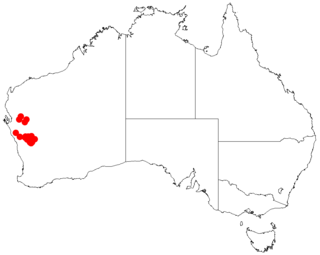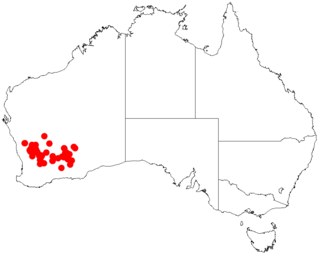
Acacia arcuatilis is a shrub belonging to the genus Acacia and the subgenus Juliflorae that is endemic to south western parts of Australia.

Acacia desertorum is a shrub belonging to the genus Acacia and the subgenus Juliflorae that is endemic to western Australia.

Acacia fauntleroyi is a shrub or small tree belonging to the genus Acacia and the subgenus Juliflorae that is endemic to a part of south western Australia.

Acacia incognita, also known as false sugar brother, is a shrub or tree belonging to the genus Acacia and the subgenus Juliflorae that is endemic to Western Australia.

Acacia jamesiana is a tree or shrub belonging to the genus Acacia and the subgenus Juliflorae that is endemic central parts of western Australia.

Acacia jibberdingensis, also known as Jibberding wattle or willow-leafed wattle, is a shrub or tree belonging to the genus Acacia and the subgenus Juliflorae that is endemic to Western Australia.

Acacia levata is a shrub belonging to the genus Acacia and the subgenus Juliflorae that is endemic to small arid area of western Australia.

Acacia lirellata is a shrub belonging to the genus Acacia and the subgenus Juliflorae that is endemic to south western Australia.

Acacia multispicata, commonly known as spiked wattle, is a shrub belonging to the genus Acacia and the subgenus Juliflorae that is endemic to south western Australia.

Acacia sibina is a tree or shrub belonging to the genus Acacia and the subgenus Juliflorae the is endemic to parts of western Australia.

Acacia stipuligera is a tree or shrub belonging to the genus Acacia and the subgenus Juliflorae. It is native to arid and tropical parts of northern Australia.

Acacia errabunda is a shrub belonging to the genus Acacia and the subgenus Phyllodineae native to Western Australia.

Acacia densiflora is a shrub of the genus Acacia and the subgenus Plurinerves that is endemic to an area of south western Australia.

Acacia inceana is a shrub or tree of the genus Acacia and the subgenus Plurinerves that is endemic to south western Australia.
Acacia papulosa is a shrub of the genus Acacia and the subgenus Plurinerves that is endemic to a small area along the south coast of south western Australia.

Acacia juncifolia, commonly known as rush-leaf wattle, is a shrub or tree belonging to the genus Acacia and the subgenus Phyllodineae that is endemic to north eastern Australia.

Acacia nematophylla, commonly known as coast wallowa, is a shrub belonging to the genus Acacia and the subgenus Phyllodineae where it is endemic to southern Australia.

Acacia semirigida, also known as stony ridge wattle, is a shrub or tree belonging to the genus Acacia and the subgenus Phyllodineae native to north eastern Australia.

Acacia curranii, also known as curly-bark wattle, is a shrub belonging to the genus Acacia and the subgenus Juliflorae that is native to north eastern Australia. It is listed as vulnerable under the Environment Protection and Biodiversity Conservation Act 1999.

Acacia meiosperma is a shrub or tree belonging to the genus Acacia and the subgenus Juliflorae that is native to north eastern Australia.



















